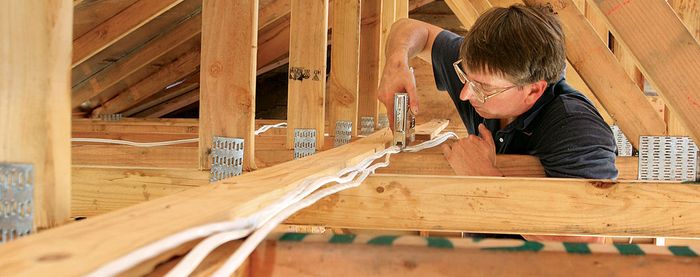For Electrical Safety, Lock and Tag the Breaker Panel
Just because you threw the switch, it doesn’t mean it’s off!
Electrical shock can cause serious injury and even death. So when working with electricity, the only way to prevent shock is to make sure the power is off. In this video from the Fine Homebuilding archives, Sacramento, California electrical contractor Cliff Popejoy demonstrates a few procedures that, when followed, will guarantee your safety and the safety of those you work with.
Note: As an added measure of safety, you should always test a circuit with an electrical tester before touching any wiring.
From Fine Homebuilding #168






View Comments
And be sure you find all of the breakers you need to turn off if you are just shutting off individual breakers.
My house was wired in the 1980s. I don't know if this is code now, but apparently it was then: they ran 12-3 plus ground to the first outlet box, then split that into two separate outlet circuits. Each hot was on its own breaker and the common was common to both. They used breakers next to each on opposite poles, so I suppose the current on the common cancels out.
Anyway, I had to move the outlet and box a little bit to accommodate some new cabinets. I put a tester in the outlet, found the breaker for that outlet, turned it off, proceeded to unwire the outlet and ZAP! I've been shocked before, but rarely so thoroughly.
I had told my wife and friend what I was doing, so I was really cussing them out for turning the breaker back on, though they both denied it. I went out and checked and sure enough, the breaker was still off. Then I looked inside the box and noticed that one of the wires was red. That's when my own light went on. I checked the panel and sure enough, the breaker next to it powered the other lead in my box. I looked around and found three or four more setup just like that.
I guess this is a good reason for shutting off the main breaker, but you can't always do that in an occupied building when it might be a few days before you are done making your changes. So be careful and thoughtful when you open up a box and look to make sure you understand how it was wired.
I'm 61 and have done a lot of my own wiring - including two full new houses, a complete rewire with new service, and multiple remodels. I always pull a permit when I add anything, but in this case I was just moving a box. I guess you're never too old to learn something new. Catch is, with electrical you need to be careful how you do your learning or you might not get any older.
Whether commercial or residential, there is always SOMEONE who "knows better" and ignores/defeats any mere sign, or comes storming up demanding you take off the lock, sometimes going up the chain of command to countermand your safety precautions. Then there were the times there was hidden wiring going direct from the power lugs or twisted&hidden in the breaker box that left circuit(s) live. You begin to develop conspiracy theories. Once, someone ran a "20-amp" circuit direct from the generator main panel bus bars (aboard ship). It took days to track that one down - the electrician and the electronic technician diked a wire in a room that supposedly had no power. Notched the dike jaws. That defeated the lock-out.
Wish I'd known about the breaker locks.
Don't just label it: Lock it out!